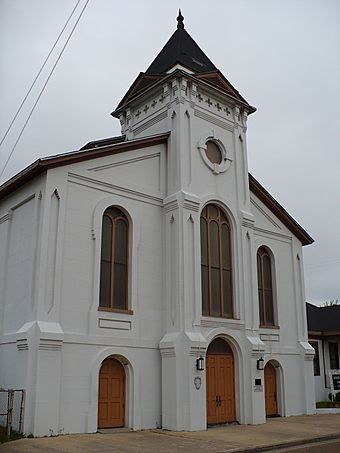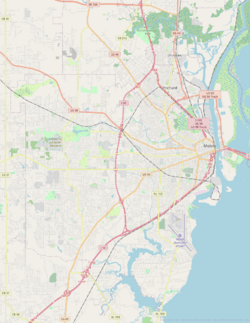State Street AME Zion Church facts for kids
|
State Street AME Zion Church
|
|

State Street AME Zion Church in 2009
|
|
| Location | 502 State Street Mobile, Alabama, United States |
|---|---|
| Built | 1854 |
| Architectural style | Romanesque |
| NRHP reference No. | 78000505 |
Quick facts for kids Significant dates |
|
| Added to NRHP | September 06, 1978 |
The State Street African Methodist Episcopal Zion Church is a very old and important church in Mobile, Alabama. It's a special place for African American history. This church building is the oldest Methodist church in all of Alabama. It was also one of the first churches for African Americans in Mobile before the American Civil War.
Contents
A Look at Its History
How the Church Started
The church began in 1829. It was first called the African Church of the City of Mobile. At that time, it was part of the Methodist Episcopal Church South. This meant it was a special project or "mission" to serve the African American community.
Building and Growth
The first church building sadly burned down. But the people didn't give up! They built the church you see today in 1854. By 1855, the church was very popular. It had 550 members. This made it one of the biggest and most successful African American churches in Alabama.
A New Path After the Civil War
After the American Civil War ended, big changes happened. Many African Americans gained freedom. The church congregation decided to join the African Methodist Episcopal Zion Church. This was a church started by and for African Americans. It was a way for them to have their own leadership and worship.
However, the old church group, the Methodist Episcopal Church South, tried to say the congregation couldn't use the building anymore. But the church members fought for their rights. Their second minister, Wilbur G. Strong, helped them. In 1872, they won the legal right to keep their church building.
A Special Landmark
Because of its unique design and important history, the State Street AME Zion Church was added to the National Register of Historic Places. This happened on September 6, 1978. Being on this list means it's a very important place that should be protected.
 | William M. Jackson |
 | Juan E. Gilbert |
 | Neil deGrasse Tyson |




